Deck 24: Digestion and Excretion
Question
Question
Question
Question
Question
Question
Question
Question
Question
Question
Question
Question
Question
Question
Question
Question
Question
Question
Question
Question
Question
Question
Question
Question
Question
Question
Question
Question
Question
Question
Question
Question
Question
Question
Question
Question
Question
Question
Question
Question
Question
Question
Question
Question
Question
Question
Question
Question
Question
Question
Question
Question
Question
Question
Question
Question
Question
Question
Question
Question
Question
Match between columns
Question
Question
Match between columns
Question
Match between columns
Question
Match between columns
Question
Question
Question
Question
Question
Question
Question
Question
Question

Unlock Deck
Sign up to unlock the cards in this deck!
Unlock Deck
Unlock Deck
1/74
Play
Full screen (f)
Deck 24: Digestion and Excretion
1
The multicelled projections that protrude from the lining of the small intestine are called ____.
A) sphincters
B) brush borders
C) microvilli
D) villi
E) macrovilli
A) sphincters
B) brush borders
C) microvilli
D) villi
E) macrovilli
D
2
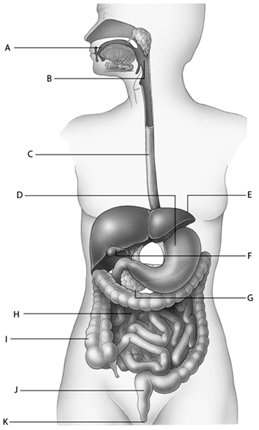 In the accompanying diagram, ____ represents the beginning of chemical digestion.
In the accompanying diagram, ____ represents the beginning of chemical digestion.A) A
B) E
C) D
D) H
E) I
A
3
The stomach____.
A) is a nonelastic sac
B) secretes enzymes that begin to break down fats
C) secretes enzymes that begin to break down proteins
D) is surrounded by three layers of skeletal muscle
E) secretes enzymes that begin mechanical digestion
A) is a nonelastic sac
B) secretes enzymes that begin to break down fats
C) secretes enzymes that begin to break down proteins
D) is surrounded by three layers of skeletal muscle
E) secretes enzymes that begin mechanical digestion
C
4
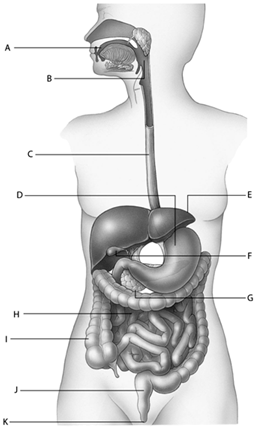 In the accompanying diagram, ____ is responsible for secreting digestive enzymes into the small intestine and hormones into the blood.
In the accompanying diagram, ____ is responsible for secreting digestive enzymes into the small intestine and hormones into the blood.A) D
B) E
C) F
D) G
E) A

Unlock Deck
Unlock for access to all 74 flashcards in this deck.
Unlock Deck
k this deck
5
The arrows in the given diagram are pointing to the ____. 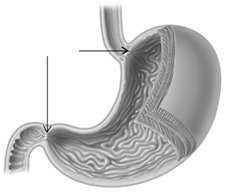
A) esophagus and small intestine
B) trachea and large intestine
C) sphincters at the top and bottom of the stomach
D) esophagus and pancreas
E) stomach

A) esophagus and small intestine
B) trachea and large intestine
C) sphincters at the top and bottom of the stomach
D) esophagus and pancreas
E) stomach

Unlock Deck
Unlock for access to all 74 flashcards in this deck.
Unlock Deck
k this deck
6
The longest segment of the gut is the____.
A) cecum
B) small intestine
C) esophagus
D) colon
E) rectum
A) cecum
B) small intestine
C) esophagus
D) colon
E) rectum

Unlock Deck
Unlock for access to all 74 flashcards in this deck.
Unlock Deck
k this deck
7
A person choking on a piece of food____.
A) cannot talk, breathe, or cough
B) can cough but cannot breathe or talk
C) can talk and cough but is unable to breathe
D) can breathe through his or her nose if he or she remains calm
E) can breathe but cannot talk or cough
A) cannot talk, breathe, or cough
B) can cough but cannot breathe or talk
C) can talk and cough but is unable to breathe
D) can breathe through his or her nose if he or she remains calm
E) can breathe but cannot talk or cough

Unlock Deck
Unlock for access to all 74 flashcards in this deck.
Unlock Deck
k this deck
8
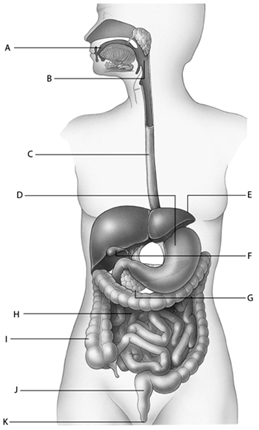 In the accompanying diagram, ____ indicates the location of chyme production.
In the accompanying diagram, ____ indicates the location of chyme production.A) A
B) D
C) E
D) F
E) G

Unlock Deck
Unlock for access to all 74 flashcards in this deck.
Unlock Deck
k this deck
9
An individual who does not produce bile has the most trouble digesting ____.
A) carbohydrates
B) proteins
C) fats
D) nucleic acids
E) essential vitamins
A) carbohydrates
B) proteins
C) fats
D) nucleic acids
E) essential vitamins

Unlock Deck
Unlock for access to all 74 flashcards in this deck.
Unlock Deck
k this deck
10
Excess energy is stored in ____, mainly in ____.
A) chemical bonds; adipose tissue
B) chemical bonds; carbohydrates
C) carbon atoms; adipose tissue
D) carbon atoms; carbohydrates
E) hydrogen bonds; water
A) chemical bonds; adipose tissue
B) chemical bonds; carbohydrates
C) carbon atoms; adipose tissue
D) carbon atoms; carbohydrates
E) hydrogen bonds; water

Unlock Deck
Unlock for access to all 74 flashcards in this deck.
Unlock Deck
k this deck
11
A person chokes when food becomes lodged in the ____.
A) esophagus
B) trachea
C) larynx
D) sinus
E) pharynx
A) esophagus
B) trachea
C) larynx
D) sinus
E) pharynx

Unlock Deck
Unlock for access to all 74 flashcards in this deck.
Unlock Deck
k this deck
12
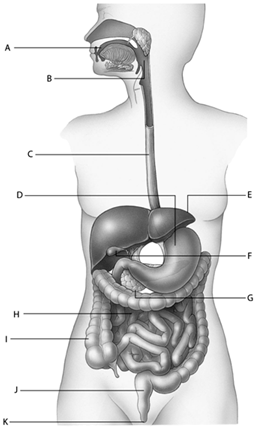 In the accompanying diagram, F represents the ____.
In the accompanying diagram, F represents the ____.A) stomach
B) liver
C) pancreas
D) gallbladder
E) small intestine

Unlock Deck
Unlock for access to all 74 flashcards in this deck.
Unlock Deck
k this deck
13
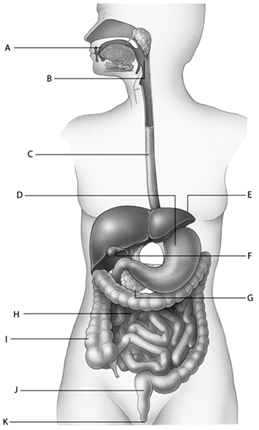 In the accompanying diagram, ____ is responsible for storing bile.
In the accompanying diagram, ____ is responsible for storing bile.A) F
B) G
C) H
D) I
E) J

Unlock Deck
Unlock for access to all 74 flashcards in this deck.
Unlock Deck
k this deck
14
A coelom is found in ____.
A) flatworms
B) earthworms
C) humans
D) earthworms and flatworms
E) humans and earthworms
A) flatworms
B) earthworms
C) humans
D) earthworms and flatworms
E) humans and earthworms

Unlock Deck
Unlock for access to all 74 flashcards in this deck.
Unlock Deck
k this deck
15
Overstuffed adipose cells harm organs by ____.
A) overfilling body cavities
B) storing hazardous chemicals
C) inducing a chronic inflammation response
D) becoming cancer cells
E) reducing oxygen flow
A) overfilling body cavities
B) storing hazardous chemicals
C) inducing a chronic inflammation response
D) becoming cancer cells
E) reducing oxygen flow

Unlock Deck
Unlock for access to all 74 flashcards in this deck.
Unlock Deck
k this deck
16
A(n)____ has the simplest system for obtaining nutrients from food.
A) earthworm
B) sponge
C) grasshopper
D) clam
E) jellyfish
A) earthworm
B) sponge
C) grasshopper
D) clam
E) jellyfish

Unlock Deck
Unlock for access to all 74 flashcards in this deck.
Unlock Deck
k this deck
17
A disruption of the stomach's protective mucus layer might give rise to ____.
A) acid reflux
B) ulcers
C) peristalsis
D) heart burn
E) choking
A) acid reflux
B) ulcers
C) peristalsis
D) heart burn
E) choking

Unlock Deck
Unlock for access to all 74 flashcards in this deck.
Unlock Deck
k this deck
18
A gastrovascular cavity is found in ____.
A) flatworms
B) sponge
C) clams
D) monkeys
E) birds
A) flatworms
B) sponge
C) clams
D) monkeys
E) birds

Unlock Deck
Unlock for access to all 74 flashcards in this deck.
Unlock Deck
k this deck
19
People homozygous for a specific high-risk allele of the fto gene ____.
A) tend to overeat
B) store more fat
C) are naturally heavier
D) are always overweight
E) cannot undergo gastric bypass surgery
A) tend to overeat
B) store more fat
C) are naturally heavier
D) are always overweight
E) cannot undergo gastric bypass surgery

Unlock Deck
Unlock for access to all 74 flashcards in this deck.
Unlock Deck
k this deck
20
Since 1980, the proportion of adults in the United States who are obese has ____.
A) decreased by half
B) doubled
C) tripled
D) decreased dramatically
E) stayed the same
A) decreased by half
B) doubled
C) tripled
D) decreased dramatically
E) stayed the same

Unlock Deck
Unlock for access to all 74 flashcards in this deck.
Unlock Deck
k this deck
21
The ____ is a flap-like structure that helps prevent food from entering the windpipe.
A) uvula
B) pharynx
C) larynx
D) epiglottis
E) esophagus
A) uvula
B) pharynx
C) larynx
D) epiglottis
E) esophagus

Unlock Deck
Unlock for access to all 74 flashcards in this deck.
Unlock Deck
k this deck
22
Fats that your body cannot make are called____.
A) essential fatty acids
B) triglycerides
C) phospholipids
D) saturated fats
E) sterols
A) essential fatty acids
B) triglycerides
C) phospholipids
D) saturated fats
E) sterols

Unlock Deck
Unlock for access to all 74 flashcards in this deck.
Unlock Deck
k this deck
23
Broad, flat molars and reduced canines characterize the teeth of ____.
A) cows
B) cats
C) wolves
D) humans
E) apes
A) cows
B) cats
C) wolves
D) humans
E) apes

Unlock Deck
Unlock for access to all 74 flashcards in this deck.
Unlock Deck
k this deck
24
Our primary source of energy is obtained from ____.
A) protein
B) fatty acids
C) carbohydrates
D) nucleic acids
E) triglycerides
A) protein
B) fatty acids
C) carbohydrates
D) nucleic acids
E) triglycerides

Unlock Deck
Unlock for access to all 74 flashcards in this deck.
Unlock Deck
k this deck
25
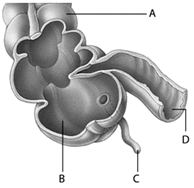 In the accompanying diagram, ____ is labeled "D."
In the accompanying diagram, ____ is labeled "D."A) the appendix
B) the cecum
C) a polyp
D) a portion of the small intestine
E) the colon

Unlock Deck
Unlock for access to all 74 flashcards in this deck.
Unlock Deck
k this deck
26
The main enzyme produced in the saliva acts on ____.
A) proteins
B) fats
C) carbohydrates
D) fats and carbohydrates
E) carbohydrates and proteins
A) proteins
B) fats
C) carbohydrates
D) fats and carbohydrates
E) carbohydrates and proteins

Unlock Deck
Unlock for access to all 74 flashcards in this deck.
Unlock Deck
k this deck
27
When a person absorbs more glucose from his or her diet than he or she need, the excess is____.
A) flushed from the system as waste
B) stored as glycogen in the muscle and liver cells
C) stored as fat in the adipose cells
D) stored as ATP in the muscle cells
E) stored as glycogen in the muscle and liver cells and as fat in the adipose cells
A) flushed from the system as waste
B) stored as glycogen in the muscle and liver cells
C) stored as fat in the adipose cells
D) stored as ATP in the muscle cells
E) stored as glycogen in the muscle and liver cells and as fat in the adipose cells

Unlock Deck
Unlock for access to all 74 flashcards in this deck.
Unlock Deck
k this deck
28
The role of a sphincter is to____.
A) control the passage of materials
B) create a churning motion
C) propagate peristalsis
D) absorb excess water from feces
E) reabsorb water
A) control the passage of materials
B) create a churning motion
C) propagate peristalsis
D) absorb excess water from feces
E) reabsorb water

Unlock Deck
Unlock for access to all 74 flashcards in this deck.
Unlock Deck
k this deck
29
From the back of the mouth to the front, the correct order of human teeth is ____.
A) molars; premolars; canines; incisors
B) premolars; molars; canines; incisors
C) canines; incisors; premolars; molars
D) molars; canines; premolars; incisors
E) incisors; canines; premolars; molars
A) molars; premolars; canines; incisors
B) premolars; molars; canines; incisors
C) canines; incisors; premolars; molars
D) molars; canines; premolars; incisors
E) incisors; canines; premolars; molars

Unlock Deck
Unlock for access to all 74 flashcards in this deck.
Unlock Deck
k this deck
30
The first sphincter through which food passes is between the ____ and the ____.
A) esophagus; stomach
B) pharynx; esophagus
C) stomach; small intestine
D) small intestine; large intestine
E) colon; rectum
A) esophagus; stomach
B) pharynx; esophagus
C) stomach; small intestine
D) small intestine; large intestine
E) colon; rectum

Unlock Deck
Unlock for access to all 74 flashcards in this deck.
Unlock Deck
k this deck
31
The epiglottis is located ____.
A) above the pharynx
B) below the pharynx
C) below the larynx
D) below the esophagus
E) in the middle of the pharynx
A) above the pharynx
B) below the pharynx
C) below the larynx
D) below the esophagus
E) in the middle of the pharynx

Unlock Deck
Unlock for access to all 74 flashcards in this deck.
Unlock Deck
k this deck
32
Most ulcers are caused by____.
A) eating spicy food
B) overuse of aspirin
C) bacterial infection
D) stress
E) poor diet
A) eating spicy food
B) overuse of aspirin
C) bacterial infection
D) stress
E) poor diet

Unlock Deck
Unlock for access to all 74 flashcards in this deck.
Unlock Deck
k this deck
33
Colon polyps____.
A) are mostly benign but some may become cancerous
B) are difficult to cure
C) are small growths that project from the wall of the small intestine
D) are responsible for 500,000 deaths in the United States every year
E) are usually benign but may become cancerous and are responsible for 500,000 deaths in the United States every year
A) are mostly benign but some may become cancerous
B) are difficult to cure
C) are small growths that project from the wall of the small intestine
D) are responsible for 500,000 deaths in the United States every year
E) are usually benign but may become cancerous and are responsible for 500,000 deaths in the United States every year

Unlock Deck
Unlock for access to all 74 flashcards in this deck.
Unlock Deck
k this deck
34
During absorption in the small intestine, ____ cross the brush border cells, eventually ending up in the lymph vessels.
A) simple sugars
B) fatty acids and glycerol
C) amino acids
D) nucleotides
E) complex sugars
A) simple sugars
B) fatty acids and glycerol
C) amino acids
D) nucleotides
E) complex sugars

Unlock Deck
Unlock for access to all 74 flashcards in this deck.
Unlock Deck
k this deck
35
The main function of salivary mucus is to ____.
A) break down starch
B) mechanically breakup food materials
C) make the food particles sticky
D) hydrate dry food particles
E) coat food particles so they slide down the esophagus
A) break down starch
B) mechanically breakup food materials
C) make the food particles sticky
D) hydrate dry food particles
E) coat food particles so they slide down the esophagus

Unlock Deck
Unlock for access to all 74 flashcards in this deck.
Unlock Deck
k this deck
36
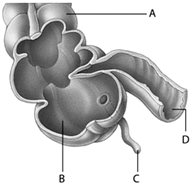 In the accompanying diagram, ____ is labeled "C."
In the accompanying diagram, ____ is labeled "C."A) the appendix
B) the cecum
C) a polyp
D) a portion of the small intestine
E) the colon

Unlock Deck
Unlock for access to all 74 flashcards in this deck.
Unlock Deck
k this deck
37
The cecum is ____.
A) the first part of the large intestine
B) connected to the rectum
C) between the stomach and the small intestine
D) a producer of enzymes for digestion in the small intestine
E) connected to the stomach
A) the first part of the large intestine
B) connected to the rectum
C) between the stomach and the small intestine
D) a producer of enzymes for digestion in the small intestine
E) connected to the stomach

Unlock Deck
Unlock for access to all 74 flashcards in this deck.
Unlock Deck
k this deck
38
The primary role of bile salts during digestion is ____.
A) osmoregulation
B) to kill bacteria that may have been consumed
C) to coat fat droplets and separate them into small droplets
D) to drive the enzymatic digestion of fats
E) to drive the enzymatic digestion of proteins
A) osmoregulation
B) to kill bacteria that may have been consumed
C) to coat fat droplets and separate them into small droplets
D) to drive the enzymatic digestion of fats
E) to drive the enzymatic digestion of proteins

Unlock Deck
Unlock for access to all 74 flashcards in this deck.
Unlock Deck
k this deck
39
Bile is ____.
A) an enzyme that digests fat
B) made in the gallbladder
C) stored in the liver
D) a mix of salts, pigments, and cholesterol
E) necessary for protein digestion
A) an enzyme that digests fat
B) made in the gallbladder
C) stored in the liver
D) a mix of salts, pigments, and cholesterol
E) necessary for protein digestion

Unlock Deck
Unlock for access to all 74 flashcards in this deck.
Unlock Deck
k this deck
40
In the human mouth, ____ begins the process of chemical digestion.
A) amylase
B) pepsin
C) bile
D) secretin
E) chime
A) amylase
B) pepsin
C) bile
D) secretin
E) chime

Unlock Deck
Unlock for access to all 74 flashcards in this deck.
Unlock Deck
k this deck
41
Water-soluble vitamins are _____.
A) stored in body fat
B) not destroyed by heat
C) often coenzymes
D) often lacking in the diet
E) stable in heat
A) stored in body fat
B) not destroyed by heat
C) often coenzymes
D) often lacking in the diet
E) stable in heat

Unlock Deck
Unlock for access to all 74 flashcards in this deck.
Unlock Deck
k this deck
42
Blood enters the kidney through the ____ and leaves the kidney through the ____.
A) renal vein; renal artery
B) nephron; renal capillary
C) renal artery; renal vein
D) renal artery; nephron
E) nephron; renal artery
A) renal vein; renal artery
B) nephron; renal capillary
C) renal artery; renal vein
D) renal artery; nephron
E) nephron; renal artery

Unlock Deck
Unlock for access to all 74 flashcards in this deck.
Unlock Deck
k this deck
43
Kidney function is measured by the____.
A) amount of urine produced over a 24-hour period
B) rate of filtration
C) rate of tubular secretion
D) rate of absorption
E) volume of urination produced overnight
A) amount of urine produced over a 24-hour period
B) rate of filtration
C) rate of tubular secretion
D) rate of absorption
E) volume of urination produced overnight

Unlock Deck
Unlock for access to all 74 flashcards in this deck.
Unlock Deck
k this deck
44
The correct path of urine out of the body is ____.
A) kidneys to ureter to bladder to urethra
B) kidneys to urethra to bladder to ureter
C) kidneys to bladder to urethra to ureter
D) kidneys to bladder to ureter to urethra
E) bladder to kidneys to ureter to urethra
A) kidneys to ureter to bladder to urethra
B) kidneys to urethra to bladder to ureter
C) kidneys to bladder to urethra to ureter
D) kidneys to bladder to ureter to urethra
E) bladder to kidneys to ureter to urethra

Unlock Deck
Unlock for access to all 74 flashcards in this deck.
Unlock Deck
k this deck
45
Kidney stones____.
A) are four times more likely to occur in men than women
B) usually cause extreme pain
C) cause no pain when they enter the ureter
D) are formed when proteins that are dissolved in the urine concentrate
E) never block the flow of urine
A) are four times more likely to occur in men than women
B) usually cause extreme pain
C) cause no pain when they enter the ureter
D) are formed when proteins that are dissolved in the urine concentrate
E) never block the flow of urine

Unlock Deck
Unlock for access to all 74 flashcards in this deck.
Unlock Deck
k this deck
46
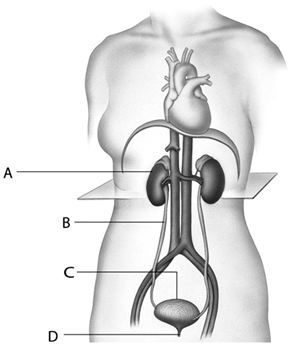 The urinary bladder, identified as ____ in the accompanying diagram, is separated from the ____ by a sphincter.
The urinary bladder, identified as ____ in the accompanying diagram, is separated from the ____ by a sphincter.A) A; ureter
B) C; ureter
C) A; urethra
D) C; urethra
E) A; urethra

Unlock Deck
Unlock for access to all 74 flashcards in this deck.
Unlock Deck
k this deck
47
A normal human urinary system consists of ____.
A) two urethras
B) two ureters
C) two bladders
D) one kidney
E) one cloaca
A) two urethras
B) two ureters
C) two bladders
D) one kidney
E) one cloaca

Unlock Deck
Unlock for access to all 74 flashcards in this deck.
Unlock Deck
k this deck
48
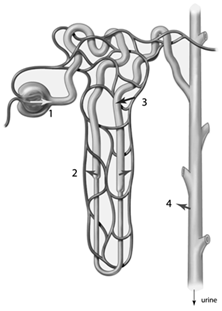
Tubular secretion occurs in the region labeled____.
A) 1 only
B) 2 only
C) 3
D) 4
E) 1 and 2

Unlock Deck
Unlock for access to all 74 flashcards in this deck.
Unlock Deck
k this deck
49
Vitamins are ____.
A) organic substances
B) inorganic substances
C) required in small amounts for normal metabolism
D) organic substances that are required in small amounts for normal metabolism
E) inorganic substances that are required in small amounts for normal metabolism
A) organic substances
B) inorganic substances
C) required in small amounts for normal metabolism
D) organic substances that are required in small amounts for normal metabolism
E) inorganic substances that are required in small amounts for normal metabolism

Unlock Deck
Unlock for access to all 74 flashcards in this deck.
Unlock Deck
k this deck
50
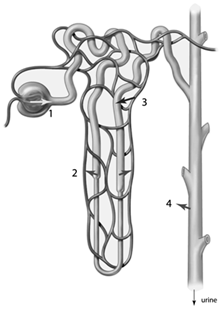
The accompanying diagram represents a single____.
A) nephron
B) kidney
C) renal capillary
D) renal vein
E) renal artery

Unlock Deck
Unlock for access to all 74 flashcards in this deck.
Unlock Deck
k this deck
51
If you were to consume too much vitamin C, _____.
A) it would be stored in your adipose tissue
B) it would be stored in your liver
C) you would metabolize it for energy
D) you would eliminate it in your urine
E) it will become toxic
A) it would be stored in your adipose tissue
B) it would be stored in your liver
C) you would metabolize it for energy
D) you would eliminate it in your urine
E) it will become toxic

Unlock Deck
Unlock for access to all 74 flashcards in this deck.
Unlock Deck
k this deck
52
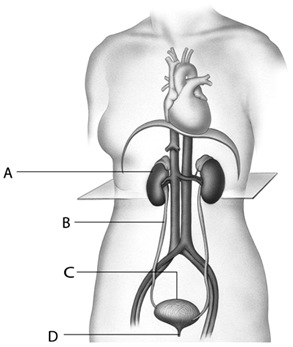 The ____, labeled as ____ in the accompanying diagram, is a channel for urine to flow from the kidney to the urinary bladder.
The ____, labeled as ____ in the accompanying diagram, is a channel for urine to flow from the kidney to the urinary bladder.A) urethra; B
B) urethra; D
C) ureter; D
D) ureter; B
E) ureter; C

Unlock Deck
Unlock for access to all 74 flashcards in this deck.
Unlock Deck
k this deck
53
Someone who has consumed a lot of alcohol becomes dehydrated because alcohol ____.
A) inhibits antidiuretic hormone (ADH) secretion, which leads to an increase in urination
B) increases antidiuretic hormone (ADH) secretion, which leads to an increase in urination
C) inhibits antidiuretic hormone (ADH) secretion, which leads to a reduction in urination
D) increases antidiuretic hormone (ADH) secretion, which leads to a reduction in urination
E) and water don't mix, which leads to an exclusion of water
A) inhibits antidiuretic hormone (ADH) secretion, which leads to an increase in urination
B) increases antidiuretic hormone (ADH) secretion, which leads to an increase in urination
C) inhibits antidiuretic hormone (ADH) secretion, which leads to a reduction in urination
D) increases antidiuretic hormone (ADH) secretion, which leads to a reduction in urination
E) and water don't mix, which leads to an exclusion of water

Unlock Deck
Unlock for access to all 74 flashcards in this deck.
Unlock Deck
k this deck
54
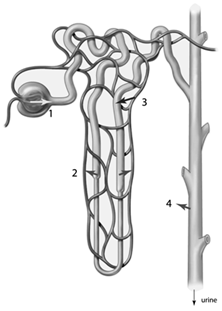
Reabsorption of water and essential solutes occurs in the region labeled____.
A) 1
B) 2
C) 3 only
D) 4 only
E) 3 and 4

Unlock Deck
Unlock for access to all 74 flashcards in this deck.
Unlock Deck
k this deck
55
In vertebrates, the main function of the urinary system is to____.
A) rid the body of excess water
B) rid the body of unwanted solutes
C) conserve excess water
D) rid the body of excess water and unwanted solutes
E) rid the body of solid wastes
A) rid the body of excess water
B) rid the body of unwanted solutes
C) conserve excess water
D) rid the body of excess water and unwanted solutes
E) rid the body of solid wastes

Unlock Deck
Unlock for access to all 74 flashcards in this deck.
Unlock Deck
k this deck
56
An essential amino acid or fatty acid is _____.
A) needed in large amounts by the body
B) dispensable
C) not synthesized by the body
D) an essential component of digestive enzymes
E) required daily
A) needed in large amounts by the body
B) dispensable
C) not synthesized by the body
D) an essential component of digestive enzymes
E) required daily

Unlock Deck
Unlock for access to all 74 flashcards in this deck.
Unlock Deck
k this deck
57
Vitamin B3 is a precursor of ____.
A) NADH
B) ATP
C) DNA
D) RNA
E) FADH
A) NADH
B) ATP
C) DNA
D) RNA
E) FADH

Unlock Deck
Unlock for access to all 74 flashcards in this deck.
Unlock Deck
k this deck
58
The ____ would most likely contain blood that needs to be cleansed.
A) renal vein
B) renal artery
C) nephron
D) kidney
E) bladder
A) renal vein
B) renal artery
C) nephron
D) kidney
E) bladder

Unlock Deck
Unlock for access to all 74 flashcards in this deck.
Unlock Deck
k this deck
59
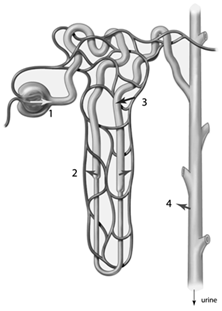
Filtration occurs in the region labeled____.
A) 1
B) 2 only
C) 3 only
D) 4
E) 2 and 3

Unlock Deck
Unlock for access to all 74 flashcards in this deck.
Unlock Deck
k this deck
60
During the reabsorption process, ____ of the water in the tubules is returned to the blood.
A) 10 percent
B) 25 percent
C) 50 percent
D) 99 percent
E) 100 percent
A) 10 percent
B) 25 percent
C) 50 percent
D) 99 percent
E) 100 percent

Unlock Deck
Unlock for access to all 74 flashcards in this deck.
Unlock Deck
k this deck
61
Match between columns

Unlock Deck
Unlock for access to all 74 flashcards in this deck.
Unlock Deck
k this deck
62
Hemodialysis____.
A) involves removing the patient's blood, cleansing it, and returning it to the body
B) can be done at home by pumping dialysis solution into the abdominal cavity
C) only needs to be performed once a month
D) replaces a person's blood during the filtration process
E) is only required while a kidney heals itself
A) involves removing the patient's blood, cleansing it, and returning it to the body
B) can be done at home by pumping dialysis solution into the abdominal cavity
C) only needs to be performed once a month
D) replaces a person's blood during the filtration process
E) is only required while a kidney heals itself

Unlock Deck
Unlock for access to all 74 flashcards in this deck.
Unlock Deck
k this deck
63
Match between columns

Unlock Deck
Unlock for access to all 74 flashcards in this deck.
Unlock Deck
k this deck
64
Match between columns

Unlock Deck
Unlock for access to all 74 flashcards in this deck.
Unlock Deck
k this deck
65
Match between columns

Unlock Deck
Unlock for access to all 74 flashcards in this deck.
Unlock Deck
k this deck
66
ADH affects the process of ____.
A) filtration
B) secretion
C) reabsorption
D) excretion
E) elimination
A) filtration
B) secretion
C) reabsorption
D) excretion
E) elimination

Unlock Deck
Unlock for access to all 74 flashcards in this deck.
Unlock Deck
k this deck
67
The capillaries clustered around kidney tubule cups differ from other capillaries in that they____.
A) have a much wider diameter
B) are much leakier
C) have arterioles at either end
D) carry lymph with blood
E) have more than one of these characteristics
A) have a much wider diameter
B) are much leakier
C) have arterioles at either end
D) carry lymph with blood
E) have more than one of these characteristics

Unlock Deck
Unlock for access to all 74 flashcards in this deck.
Unlock Deck
k this deck
68
ADH____.
A) increases glucose reabsorption
B) decreases the filtration rate
C) increases tubular secretion
D) increases water reabsorption
E) decreases amino acid reabsorption
A) increases glucose reabsorption
B) decreases the filtration rate
C) increases tubular secretion
D) increases water reabsorption
E) decreases amino acid reabsorption

Unlock Deck
Unlock for access to all 74 flashcards in this deck.
Unlock Deck
k this deck
69
A kidney transplant ____ has the best chance of success.
A) followed by a lifetime of dialysis
B) from a deceased donor
C) from a living donor
D) from an animal donor
E) occurring after peritoneal dialysis
A) followed by a lifetime of dialysis
B) from a deceased donor
C) from a living donor
D) from an animal donor
E) occurring after peritoneal dialysis

Unlock Deck
Unlock for access to all 74 flashcards in this deck.
Unlock Deck
k this deck
70
Most transplanted kidneys come from ____.
A) living donors
B) cadavers
C) other animal species
D) laboratory-grown tissues
E) individuals compensated for kidney donation
A) living donors
B) cadavers
C) other animal species
D) laboratory-grown tissues
E) individuals compensated for kidney donation

Unlock Deck
Unlock for access to all 74 flashcards in this deck.
Unlock Deck
k this deck
71
A nephron____.
A) is a kidney tubule
B) replaces the blood
C) forms feces
D) connects the kidneys to the bladder
E) is the functional unit of the kidney
A) is a kidney tubule
B) replaces the blood
C) forms feces
D) connects the kidneys to the bladder
E) is the functional unit of the kidney

Unlock Deck
Unlock for access to all 74 flashcards in this deck.
Unlock Deck
k this deck
72
Blood pressure forces fluid through the spaces between cells in nephrons during the process of ____.
A) filtration
B) reabsorption
C) secretion
D) elimination
E) excretion
A) filtration
B) reabsorption
C) secretion
D) elimination
E) excretion

Unlock Deck
Unlock for access to all 74 flashcards in this deck.
Unlock Deck
k this deck
73
The physical structure of the capillaries in the nephron ____.
A) ensures balanced filtration
B) prevents proteins from filtering into urine
C) allow blood cells to pass readily out of the kidneys
D) hold in salt ions
E) block foreign metabolites from entering the urinary tract
A) ensures balanced filtration
B) prevents proteins from filtering into urine
C) allow blood cells to pass readily out of the kidneys
D) hold in salt ions
E) block foreign metabolites from entering the urinary tract

Unlock Deck
Unlock for access to all 74 flashcards in this deck.
Unlock Deck
k this deck
74
Tubular secretion is essential for ____ homeostasis.
A) pH
B) water
C) solute
D) temperature
E) sugar
A) pH
B) water
C) solute
D) temperature
E) sugar

Unlock Deck
Unlock for access to all 74 flashcards in this deck.
Unlock Deck
k this deck


